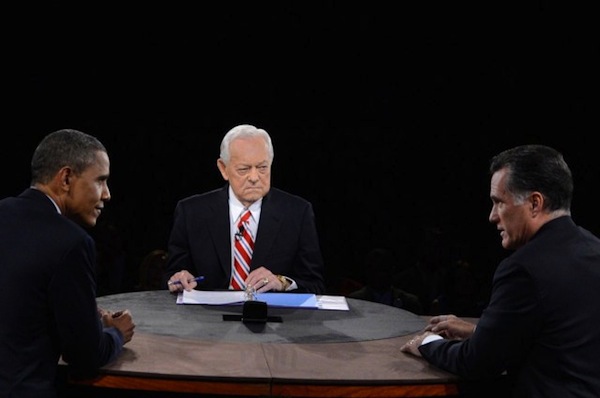
The candidates debate at Lynn College. Source: Getty
“In the words of my mom, ‘Go vote.’ It makes you feel big and strong.” With this inspiring statement from moderator Bob Schieffer, the final presidential debate concluded, leaving two weeks left until November 6.
The third debate, on foreign policy, reinforced the major theme of this election: job creation. Throughout the debates, several foreign policy issues not directly related to the economy have had prominent moments — Benghazi, the size of the military, and the tenor that each candidate would set for foreign affairs beginning in 2013. Ultimately, though, the campaigns have come down to jobs, and I would argue that in the third debate, the candidates engaged the jobs issue even more vehemently than they did in the first debate on the economy.
The similarities in the candidates’ foreign policy positions have been widely remarked upon, and I’ve certainly echoed this myself. The third debate underscored yet another convergence: the candidates’ linkage of the state of the economy and the United States’ influence overseas. As President Obama declared, “Part of American leadership is making sure that we’re doing nation building here at home. And as Governor Romney argued, “…in order to be able to fulfill our role in the world, America must be strong. America must lead. And for that to happen, we have to strengthen our economy here at home.” (Full transcript available here).
While the link between domestic affairs and America’s influence overseas is one of my primary policy interests, and while I would normally welcome it being featured prominently in a presidential debate, I believe that it did not provide American voters with valuable information on two vital fronts.
The first is the factors driving joblessness and economic stagnation in the United States, of which the candidates have given an incomplete accounting. All in all, Governor Romney and President Obama have discussed the economy in the context of standing up for Detroit, of protecting small businesses, of getting the super-rich to do their parts, of cracking down on Chinese counterfeiting and trade practices. These factors are all valid, relevant, and on the hearts and minds of American voters, but what about important macro dynamics that stand to affect the U.S. economy and global security, such as the Eurozone crisis (the word “Europe” was mentioned once in the debate) and the cooling of the BRICs economies? And what about an issue that many advanced economies are facing–the changing structure of economic activity itself? As a terrific New York Times article on the campaign and the reality of the declining quality of life in the U.S. argued,
The causes of income stagnation are varied and lack the political simplicity of calls to bring down the deficit or avert another Wall Street meltdown. They cannot be quickly remedied through legislation from Washington. The biggest causes, according to interviews with economists over the last several months, are not the issues that dominate the political debate.
At the top of the list are the digital revolution, which has allowed machines to replace many forms of human labor, and the modern wave of globalization, which has allowed millions of low-wage workers around the world to begin competing with Americans.
Not much further down the list is education, probably the country’s most diffuse, localized area of government policy. As skill levels have become even more important for prosperity, the United States has lost its once-large global lead in educational attainment.
To be sure, the candidates have taken on parts of these topics in the debates and other venues. However, I’ve noticed very little big-picture discussion that makes clear the candidates’ views on how the global economy is fundamentally different than it was even as recently as ten years ago–not in terms of ongoing financial crises, but in terms of factors like automation. The short-term emphasis is of course unsurprising in an election year; as some would argue, given the challenges of preventing the fiscal cliff in the next months, it is necessary. Solutions to the long-term economic outlook are complex and unclear, which is simultaneously why it is not a major debating point for either candidate and why I would like to hear their thoughts in greater detail. (For a great debate on the future of manufacturing, check out this recent feature from Economist.com).
Second, while the link between domestic factors and international factors is clear, the third debate on foreign policy was light on actual foreign policy discussion — something that also did not feature prominently in the first debate or the town hall. Again, this is not surprising given the national attention to the state of the economy, but in a forum like Foreign Policy Blogs, it goes without saying that more attention would have been welcome.
When I think back to the 2012 election, I’ll immediately think back to watching the debate on one half of my computer screen while watching the Twitter reaction on the other half. For me, the 2012 election is the year of the citizen fact-checker, of the debate meme, and of some excellent commentary and investigative journalism. Thank you to those of you who followed along at #fpdebates, and I look forward to more discussion in the next two weeks.